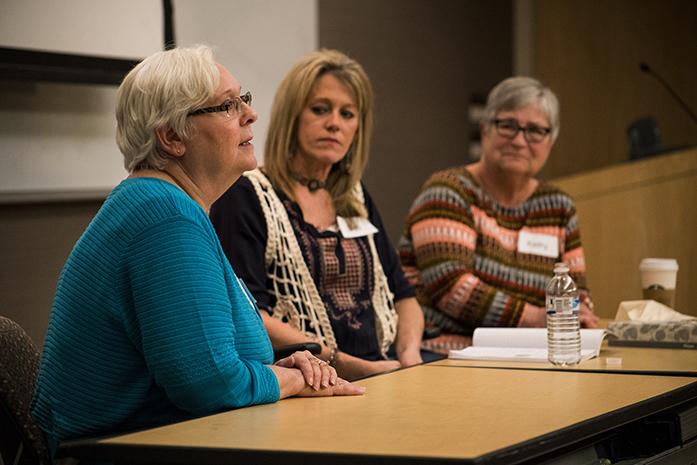“Aren’t you over it?” “Still?” “When are you going to get over it?” These are some of the questions a mother who lost her daughter to murder six years ago faces.
“When it happens to you, your life is just completely devastated,” she said to an audience on Monday. “I just want everyone to know there’s never any closure or completeness of it. It’s there every single day.”
This week marks the 35th National Crime Victims’ Rights Week, an annual observance led by the Office for Victims of Crime to help promote and honor the stories and rights of those affected by all types of crimes.
The Horizons Survivors Program in conjunction with the UI School of Social Work held a panel of victims, as well as family members of victims of homicide, domestic violence and vehicular homicide to speak on the impact these crimes had on their lives.
“I’m not alone. This happens a lot more frequently then you can imagine,” said a mother who lost her daughter in a car accident a number of years ago. “There’s no precedent for this on how you should feel or act, but to have that awareness that is out there and that you have this group of people out there to go to and help you, that’s super important.”
Horizons is a family service alliance based in Cedar Rapids with a survivor program that serves 20 Iowa counties. The program addresses immediate and long-term needs for those affected by death including murder, suicides, and domestic violence regardless of legality terms.
“We serve 20 counties and decided to expand out to a college town,” Penny Galvin, Victim Advocate at Horizons said. “You’re never over it. So the message I wanted the audience to hear tonight is that these women are survivors. People grieve in different ways.”
The victim-impact panel marked the annual week in efforts to spread and create awareness through advocating and sharing stories of victims of crimes ranging from domestic violence to homicide. The theme for this year’s Crime Victim Week is “Serving Victims, Building Trust, Restoring Hope.”
The week aims to highlight the importance of victim services and early intervention, building trust among victims’ and friends and family of victims in hope to enrich the recovery process, regardless of the circumstance and crime.
“It’s an ongoing pain, but you got to deal with it and start to accept,” one panel member said.
Another panel member with teary eyes explained her guilt and shame for going back to an ex-husband who once held her captive and abused her in her own home for 12 hours.
“We are survivors, and we prove that every day,” she said.



